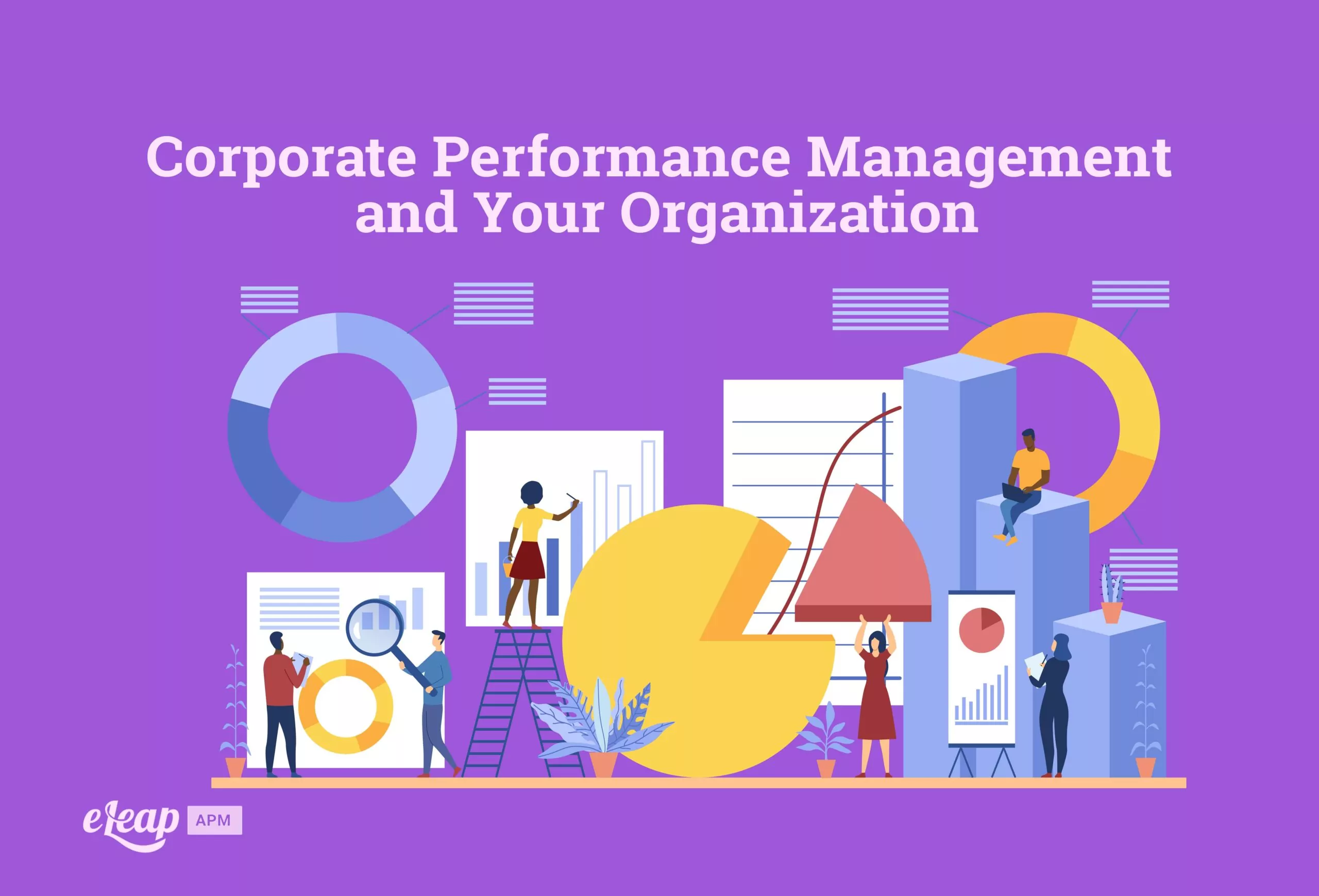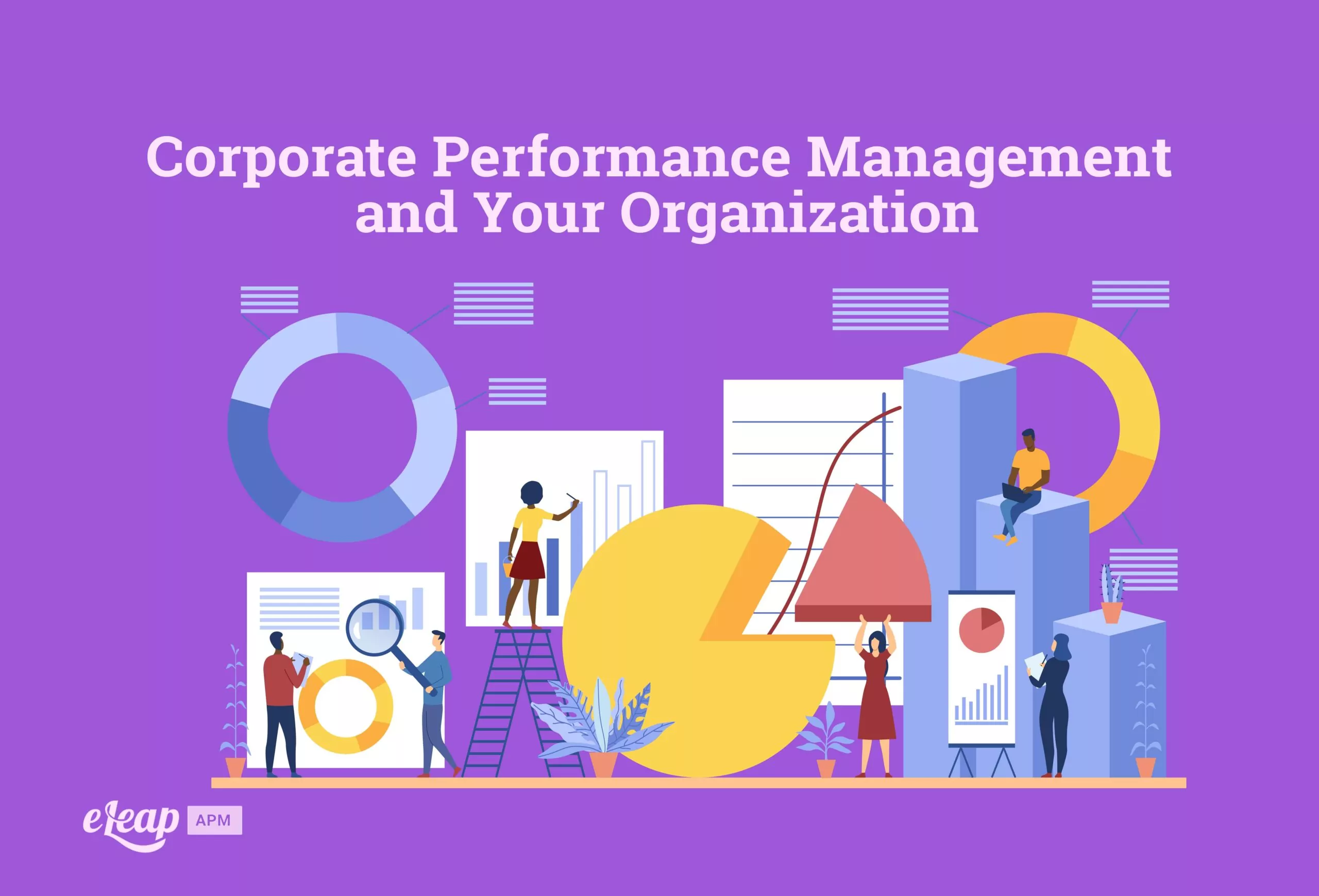Corporate Performance Management and Your Organization
How to analyze and measure your organization’s collaborative successes and failures

There is a great deal of focus on employee performance management, and rightly so. If your team members are not able to reach stated goals and objectives, it affects the organization. However, corporate performance management (CPM) is just as important. Unsure what that term means or how it applies to your organization? In this guide, we’ll explore what CPM is all about and what leaders and decision-makers must know about it. Explore how eLeaP’s Performance Management Platform can simplify evaluations, boost productivity, and drive measurable results.

What Is Corporate Performance Management?
You’ll find many definitions for corporate performance management out there today, but Gartner sums it up best. Corporate performance management, “is an umbrella term that describes the methodologies, metrics, processes, and systems used to monitor and manage the business performance of an enterprise.”
You may be more familiar with CPM by another name. It is also called business performance management and enterprise performance management. Whatever name you use, it amounts to the same thing – the ability to analyze and measure your organization’s collaborative successes and failures.
What Is Corporate Performance Management Used For?
CPM is used for many things, but they can all be summed up as “being able to evaluate where your organization is now and creating a roadmap to where you want to be in the future”. It’s all part of business intelligence (BI) and effective planning.
Why Do Organizations Need Both CPM and Employee Performance Management?
Employee performance management (EPM or PM) gets more focus than corporate performance management for many reasons. However, both are necessary to run a successful organization regardless of your industry or niche. This applies just as much to nonprofit organizations as it does to for-profit businesses.
Why is it so important, though? Why do you need both CPM and EPM? Let’s compare the two head-to-head.
CPM vs. EPM
Don’t conflate EPM with CPM. The two are very different.
CPM
Corporate performance management focuses on the health and success of the organization as a whole. As such, that includes the contributions and failures of every single employee, from the newest hire all the way up to the C suite, from the mailroom to the boardroom.
EPM
While CPM focuses on the success of the organization as a whole, EPM focuses on individual employee performance and how that affects their team. From there, it spreads out to the department and then to the wider organization (because nothing occurs in a vacuum and every employee affects the others), but EPM’s focus ends with the individual.
How They Work Together
So, CPM is focused on the organization, and EPM is focused on your people. When you put them together, you have the means to evaluate the health and performance of the company and its employees. By using both performance management methodologies, it becomes possible to get a holistic view of the organization and everything within it. That makes it simpler to connect the dots and determine both cause and effect.
It’s important to realize that using one without the other will not provide much in the way of improvement. Strategies developed through CPM will do you little good if there are performance problems with employees. The converse is also true – it’s impossible to make meaningful course corrections for employees if the organization is unable to control costs or align KPIs with mission-critical goals and objectives.
What Are the Uses for Corporate Performance Management?
CPM has implications for a wide range of business-related activities and goals. However, it is primarily used for specific objectives, including the following:
- KPI Alignment – CPM can be a crucial tool for ensuring that your organization and all departments in it are aligned with the right key performance indicators (KPIs). This also applies to other aspects, such as aligning your KPIs with your organization’s mission.
- Cost Reduction – Corporate performance management is all about creating strategies to help make achieving objectives simpler and easier. That can also include reducing costs in a wide range of ways.
- Organizational Strategy – Without the right strategies, your organization is at a competitive disadvantage. CPM provides the opportunity to design strategies tailored to your unique needs, goals, and other factors.
- Budgeting – CPM can do more than just help reduce costs by improving efficiency and eliminating redundancy. It can help you remodel your budget (for the entire organization and per department or team, as well).
- Financial Planning – Without the right financial planning, it’s impossible to achieve measured, sustainable growth. Corporate performance management offers the ability to improve your financial planning process.
Finding the Right Tools
CPM isn’t something that should be done manually. You’ll need a software tool to help. Of course, this begs the question, what makes a good CPM tool? What features and capabilities should you look for in performance management software in the first place?
Automation
One of the first things to consider is the software’s ability to automate mundane processes. Often, these are hidden sources of wasted time and money. Automating them can ensure that your people can focus on more important tasks while simultaneously eliminating the potential for human error in reporting and forecasting.
Create Budgets
The performance management software you choose should provide the means to create budges of all types and for a range of purposes. We’re talking about department budgets but also project-related budgets and everything in between.
Plans
One of the primary benefits of performance management software is the ability to create detailed plans that tie together various elements of success, including your people, the goals set for them, how those goals affect the organization, and more.
Reporting
With the right software, you’ll have access to in-depth, analytical reporting that allows you to drill down into performance metrics and make informed, data-driven decisions that fuel success.
Forecasting
Your software should support accurate forecasting based on custom budgets and plans you create.
Is CPM the Tool You’ve Been Missing?
As you can see, corporate performance management is a critical consideration. It dovetails with employee performance management to provide a complete view of the organization and provides the means to make informed decisions that drive success. The right CPM software can unlock these benefits and more.